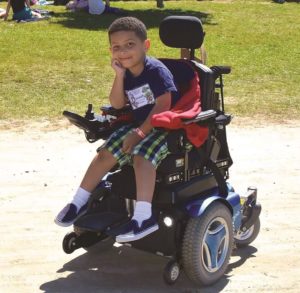TRURO — For parents of children with disabilities, the path from the first signs of a child’s developmental delay to a supportive school setting is a difficult one.
The first challenge comes as parents begin to observe and identify their children’s particular struggles. After that, families on the Outer Cape must confront the fact that needed specialists are some distance away. And, in a small community, it’s harder to connect with other families who’ve had similar experiences.
But support for parents and children does exist here. The first stop is often the family’s pediatrician, who can make a referral to the Kennedy-Donovan Center’s Cape & Islands Early Intervention Program in Yarmouth — the only such program on the Cape.
The services there for children from birth to age three are comprehensive, ranging from evaluation to referrals to specialists’ care. Parents needn’t wait for a doctor’s referral — they can reach out directly, said Sue Homan, the center’s senior director of early intervention and autism services. The program is open to any Massachusetts family with a child under three and is covered either by insurance or by the state’s Dept. of Public Health.
“Since early intervention started 35 years ago,” said Homan, “it has proved that getting kids involved at this early age helps them not need as many interventions later in life.”
The most common disabilities that occur in early childhood, Homan said, are language delays. Truro Central School special education teacher and parent Hannah King reached out to the Kennedy-Donovan Center for help last year when she had a feeling her then 18-month-old daughter Charlotte’s speech and language development wasn’t on track.
After receiving early intervention services through the program, the family is now planning three-year-old Charlotte’s transition to preschool.
The whole process starts as a difficult conversation, but it doesn’t always have to be that way, King said. “There’s a stigma around disabilities,” she said. “We don’t want to talk about it. But it’s important for both child and family to be educated so a child can see the power in their disability and feel less alone.”
King encourages parents to go with their instincts when assessing their children’s development. “If you feel like there’s a problem,” she said, “ask questions and seek advice.”

Mateo was two and a half years old when his parents, Paloma and Aarón Hobart, who were living in Provincetown at the time, noticed changes in his behavior. “He went from having 18 words down to half of one word,” Aarón said. “Instead of ‘mama,’ he would say ‘ma.’ That was the only word he had left.”
The couple noticed other changes that worried them. “He stopped making eye contact,” Paloma said. “He didn’t want to be touched. He started crying a lot, and he was irritable all the time.”
Mateo’s pediatrician in Yarmouth referred the family to the early intervention program, which connected them with pediatric neurologist Margaret Bauman, who has a practice in Newton and Sandwich. Dr. Bauman diagnosed Mateo with autism and anxiety disorder.
About 10 percent of the 400 children in the Kennedy-Donovan Center’s program have an autism diagnosis or will be seeking one in the next six months, Homan said. Autism was, in the past, rarely diagnosed before age five, according to Homan. Having resources at an earlier age, she said, “has made a world of difference.”
Physical challenges, too, can appear gradually. For the first year of Isaiah Edwards’s life, his mother, Krista, thought her son had low muscle tone after treatments for hip dysplasia, for which he went through surgery at Boston Children’s Hospital.
Edwards, who lives in Truro, sought help from the early intervention program, which included weekly home visits from occupational, physical, and speech therapists.
It was after having her daughter Eva a year later that Edwards realized how delayed Isaiah’s development was. Whereas Eva quickly learned to run after walking, Isaiah still struggled to walk slowly.

In Isaiah’s case, early intervention did not seem to help his walking. He was referred to a neurologist and was diagnosed with a rare type of congenital muscular dystrophy.
For many children, help from the Kennedy-Donovan Center begins with a Battelle Developmental Inventory, an evaluation of children’s milestones in five domains: adaptive, personal-social, communication, motor, and cognitive. If the child is found to be eligible, an individualized family service plan is made to set developmental goals.
Families receive weekly at-home or telehealth services with early intervention specialists who have expertise in the child’s specific needs.
Currently, there are 35 clinicians working with 15 children in the four Outer Cape towns, said Homan.
Parents attend the specialists’ visits with their children to learn techniques and apply them during the rest of the week. Parent support groups and community playgroups also help.
Reevaluation happens annually until a student moves from the early intervention program to preschool.
For Mateo, “the early intervention years were incredible,” said Paloma Hobart. “The therapists were 100 percent on doing anything possible to help,” Aarón Hobart added.
Even though Charlotte King’s speech therapy had to happen online because of the pandemic, her mother said it helped. At the outset, she said, her daughter “knew what she wanted to say, but she just couldn’t yet.” The family support plan, she said, “gave us a baseline and we were able to measure our progress as we went through therapy.”
Isaiah’s early intervention speech and physical therapies improved the volume of his voice and increased his mobility, his mother said. But, she added, there were disappointments along the way: mainly, Edwards said, the fact that no one saw the signs of Isaiah’s muscular dystrophy sooner.
“You have to be a tiger for your kids,” Aarón Hobart said. “The key is to get early intervention and to pick and choose your battles,” he said, “and if it’s not working, make sure you’re telling somebody to try something else.”
King worries that not all parents understand how important early interventions can be.
“We all want childcare for our kids so we can go to work, and so they can socialize,” she said. But she thinks prioritizing early intervention, time-consuming as it was, has been important for her daughter’s development. “It’s important to be proactive instead of reactive.”
